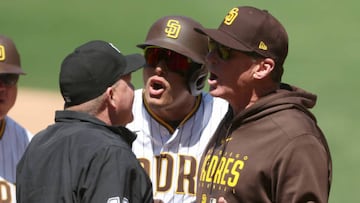Manny Machado ejected over pitch-clock argument: How does the new rule work?
While it’s obvious that the pitch clock has had an immediate effect on games, it’s also equally clear that the learning curve has proven difficult for some.

With MLB’s rule changes for the 2023 season now in effect, there are understandably mixed emotions among fans, players and coaches alike. On the other hand, change as we all know is something that can’t be denied. The Padres star apparently found that out the hard way.
Padres’ Manny Machado ejected for arguing pitch clock violation
On Tuesday night, San Diego Padres star Manny Machado was called out by the umpire after a pitch clock violation led to a third strike in what was his first at-bat against the Diamondbacks. Unfortunately, it didn’t stop there. Visibly enraged, Machado proceeded to unleash on plate umpire, Ron Kulpa, as he made it clear he was not happy in the least with the decision. Predictably, it didn’t take long before the third baseman found himself ejected from the game for arguing against the decision.
At that point, things went from bad to worse. Clearly acting in support of his player, Padres manager Bob Melvin approached the umpire and attempted to plead on Machado’s behalf, but only managed to find himself being ejected alongside Machado as well.
Should Manny Machado have been ejected?
Undoubtedly there will be many varying opinions on whether Machado should have been expelled, but here’s the thing: As pitcher Zac Gallen stood ready to deliver his pitch, Machado could be seen doing everything from tapping his cleats with his bat, to fiddling with his batting gloves while standing in the box. Indeed, there was a noticeable passage of time before Kulpa finally called time in order to rule for an automatic strike. This is to say, that while it may have seemed a drastic measure, the rules - at least the new ones - are the rules. Machado is of course just the latest player in the league to run afoul of the new rule and assuredly he won’t be the last. Yet, as we now know it’s part and parcel with the game, meaning players will simply have to adjust. What adds even further context, is the fact that Machado himself admitted before the season started that he “might be down 0–1 a lot,” because of the new rule which is designed to increase the speed of the game.
How does the pitch clock work?
Despite Machado’s clear frustrations, as well as the fact that we’ve already seen a few high-profile players who’ve violated the new rule, things for the most part have run smoothly. With that said, here’s a little refresher on what exactly the pitch clock is all about. Also, it’s important to remember that the main function of the rule is, as mentioned above, to increase the speed of play in MLB games.
Pitch clock rule summary:
- The clock is 15 seconds with the bases empty and 20 seconds with a runner on base
- The clock starts when the pitcher catches the ball from the catcher and runs until the pitcher starts his delivery (not when he releases the ball)
- The batter must step in the box and be ready to hit with at least eight seconds left on the clock
- Violations by the pitcher result in an automatic ball, while those by the hitter are an automatic strike
- A hitter is granted one timeout per plate appearance
- A pitcher gets two “disengagements” per batter. This is either stepping off or a pickoff attempt. A third disengagement results in a ball. The disengagement count resets if a runner advances, such as with a stolen base, ball, wild pitch or passed ball.
It’s worth noting, that despite complaints from various corners the rule has already achieved what it was designed to do i.e., shorten the length of MLB games. To be clear, when compared with the opening games of the 2022 season, this year has seen a significant decrease in playing time with games coming in at around two hours and 38 minutes, as opposed to last year which averaged three hours and eight minutes. This is all to say, that when it comes to increasing and intensity, the rule appears to be working.






